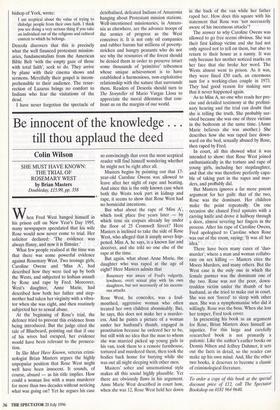Intruder in the dust Raymond Carr
THE SPEARS OF TWILIGHT by Philippe Descola HarperCollins, £20, pp. 458
Professor Descola, disenchanted with the abstractions of philosophy, switched disciplines and became an ethnologist. 'Ethnologists', he writes, 'prize uniqueness', seeking out 'a miraculously enclosed society', reprieved from the intrusion of the outside world. Intruders themselves with their tape recorders, they become passion- ate defenders of the uniqueness of the 'closed' societies they study, like big game hunters who become committed conserva- tionists in order to keep their quarries in existence. Descola found his closed society by spending two years in the dispersed settlements of the Achuar Indians, a
branch of the Jivaros of the Ecuadorian rain forest. Renowned for shrinking the heads of their enemies, many Jivaros, in spite of possessing rifles, transistors and T- shirts, have resisted the attentions of oil prospectors, rubber barons, loggers, agrari- an reformers and missionaries by retreating further into the forest.
Descola is a gifted writer, whether he is describing the submarine world of the gloomy, monotonous jungle, or the ramshackle, soulless shanty towns on the edge of the forest. No doubt this book will become an ethnographical classic. Like Tristes Tropiques, the bestseller of his master Ikvi-Strauss, it is designed to appeal to the general reader. But that reader . should be warned that Descola's design poses difficulties. He describes in great detail the daily life of the Achuar communal house-building sessions of manioc beer-drinking, hunting expeditions, trading, vendettas etc.
To put together these bits and pieces, is, he writes, the vocation of ethnologists. He does this as he goes along. This reflects the drama of discovery but often leaves the reader himself with the task of putting the bits together. It is best to savour only a couple of his chapters at a time. To attempt them at a stretch induces sleep.
I will concentrate on a few of the bits and pieces. The function of dreams, the role of women and. the Achuar concept of nature. In this oneiric society, the metaphoric content of dreams are inter- preted daily at dawn. A woman displaying her private parts portends the presence of white-lipped peccaries (pig-like creatures). 'It is very hard having only one wife', Descola is told. The Achuar practise polygamy, not from any desire to perpetu- ate the tribe, as they have little sense of history, but simply because women shed their sexual attractions with age. Wives are brutally treated, hit over the head with machetes. This poses a severe dilemma for the ethnologist, who brings with him the morality of the West, but must accept the mores of the tribe, if, as an outsider, he wishes to be trusted as a tem- porary insider. Otherwise his field notes will suffer.
It is the Achuar concept of nature that constitutes the fascination of this book. Each animal species is governed by an amana who releases a given number for men to hunt. Animals are not domesticated because they would then have two masters. They cannot be subject to 'the undemand- ing morality of the stable and the chicken run'. Animals are not killed for sport. With souls like our own, members of our own species, why should they be made to suffer unnecessarily? Only those things that do not possess a soul constitute the otherness of nature as we conceive it.
Dr John Hapgood, the former Arch- bishop of York, wrote:
I am sceptical about the value of trying to dislodge people from their own faith. I think you are doing a very serious thing if you take an individual out of the religious and cultural context to which he belongs.
Descola discovers that this is precisely what the well financed protestant mission- aries, fundamentalists from the American Bible Belt 'with the empty gaze of those with total faith', seek to do. They arrive by plane with their cinema shows and sermons. Mercifully their gospel is incom- prehensible to their audience. The resur- rection of Lazarus brings no comfort to Indians who fear the visitations of the dead.
I have never forgotten the spectacle of
detribalised, defeated Indians of Amazonia hanging about Protestant mission stations. Well-intentioned missionaries, in Amazo- nia as elsewhere, are the advance troops of the armies of progress as the West conceives it. It is not only oil companies and rubber barons but millions of poverty- stricken and hungry peasants who do not see why the resources of the forest should be denied them in order to preserve intact some thousands of 'primitive' tribesmen whose unique achievement is to have established a harmonious, non-exploitative relationship with the nature that surrounds them. Readers of Descola should turn to The Storyteller of Mario Vargas Llosa to appreciate the moral dilemmas that con- front us on the margins of our world.



























































 Previous page
Previous page